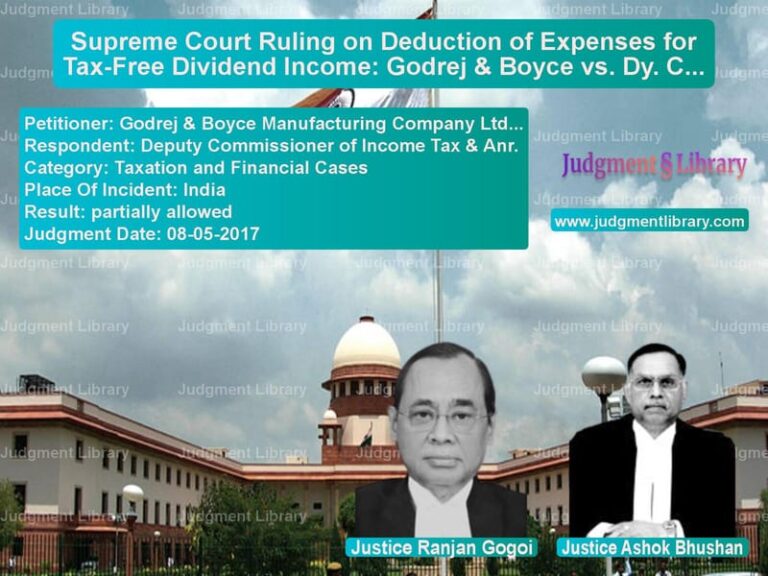Supreme Court Clarifies Anti-Dumping Duty on Imported Stainless Steel Products
The case of Commissioner of Customs (Export) Nhava Sheva v. M/S Mascot International revolves around the interpretation and applicability of anti-dumping duties imposed on specific stainless steel products. The dispute arose over whether anti-dumping duty applied to stainless steel products with widths between 1250 mm and 1280 mm, under the notifications issued by the Central Government. The Supreme Court’s ruling clarified the applicability of anti-dumping duties based on product specifications and tolerance limits.
Background of the Case
The Central Government imposed an anti-dumping duty on cold-rolled flat products of stainless steel under Notification No. 14/2010-Cus., dated 20.02.2010, which covered products imported from China PR, Japan, Korea, the European Union, South Africa, Taiwan, Thailand, and the USA. The notification specifically targeted products:
- With widths of 600 mm up to 1250 mm.
- With thickness up to 4 mm.
- Further worked than cold-rolled (cold-reduced).
However, a mid-term review was conducted due to concerns raised by domestic industries. The industry argued that importers were evading anti-dumping duties by misdeclaring product widths slightly beyond the 1250 mm threshold. As a result, Notification No. 86/2011-Cus., dated 06.09.2011, was issued to introduce tolerance limits:
- For mill-edged cold-rolled stainless steel: A width tolerance of (+) 30 mm was applied.
- For rim-edged cold-rolled stainless steel: A width tolerance of (+) 4 mm was applied.
The key legal question before the Court was:
“Whether Anti-Dumping Duty is applicable on flat roll products of stainless steel having widths between 1250 mm and 1280 mm under Notification No. 14/2010-Cus., dated 20.02.2010, as amended by Notification No. 86/2011-Cus., dated 06.09.2011?”
Arguments of the Petitioner (Customs Department)
The Customs Department contended:
- The anti-dumping duty notification clearly intended to cover all stainless steel products up to 1250 mm but required a tolerance level for enforcement.
- The mid-term review justified an extension of the width range to 1251 mm to 1300 mm to prevent circumvention.
- The imported products in question, with widths between 1251 mm and 1280 mm, were liable for anti-dumping duty as per the revised notification.
Arguments of the Respondent (Mascot International)
The respondent, Mascot International, countered:
- The original notification restricted anti-dumping duty to stainless steel products strictly up to 1250 mm width.
- The mid-term review and the subsequent notification could not be applied retrospectively.
- Their imports fell within the range of 1251 mm to 1280 mm, and as such, should not be subjected to anti-dumping duty.
Supreme Court’s Analysis and Judgment
The Supreme Court, comprising Justices A.K. Sikri and Ashok Bhushan, ruled in favor of the Customs Department, stating:
1. Anti-Dumping Duty Extends to Stainless Steel Products Up to 1280 mm
- The Court emphasized that the purpose of the mid-term review was to prevent circumvention of duties.
- The notification clearly established a tolerance limit of +30 mm, thereby covering widths up to 1280 mm.
- The respondent’s imports fell within this range and were subject to anti-dumping duty.
2. Legal Validity of the Mid-Term Review
- The Court upheld the validity of the revised notification, ruling that the extension of tolerance limits was legally sound.
- It clarified that while the original notification covered widths up to 1250 mm, the mid-term review expanded the scope without altering the intent.
3. CESTAT’s Ruling Overturned
- The Customs, Excise & Service Tax Appellate Tribunal (CESTAT) had ruled in favor of the importer, holding that only products up to 1250 mm were covered by the duty.
- The Supreme Court found that CESTAT had failed to properly interpret the 2011 notification and its implications.
- CESTAT’s decision was set aside, and anti-dumping duty was deemed applicable.
Final Judgment
- The Supreme Court allowed the appeal and reinstated the anti-dumping duty on imports with widths between 1251 mm and 1280 mm.
- CESTAT’s ruling was overturned.
- However, in a related case where goods had already been re-exported, the Supreme Court ruled that no duty would be payable.
Implications of the Judgment
The Supreme Court’s ruling establishes a clear interpretation of anti-dumping laws, reinforcing that:
- Mid-term reviews and tolerance limits are enforceable in preventing tax evasion.
- Importers cannot evade anti-dumping duties by declaring marginally higher widths.
- The notification’s scope is to be interpreted in line with legislative intent, not just its literal wording.
Conclusion
This ruling ensures strict enforcement of anti-dumping laws to protect domestic industries from unfair trade practices. By affirming the Customs Department’s stance, the Supreme Court has upheld the principles of fair trade while clarifying the legal application of notifications in customs law.
This judgment will serve as an important precedent in anti-dumping duty disputes, providing guidance on interpreting tax-related amendments and ensuring compliance with trade protection measures.
Don’t miss out on the full details! Download the complete judgment in PDF format below and gain valuable insights instantly!
Download Judgment: Commissioner of Cust vs MS Mascot Internati Supreme Court of India Judgment Dated 03-07-2017.pdf
Direct Downlaod Judgment: Direct downlaod this Judgment
See all petitions in Customs and Excise
See all petitions in Tax Evasion Cases
See all petitions in Banking Regulations
See all petitions in Judgment by A.K. Sikri
See all petitions in Judgment by Ashok Bhushan
See all petitions in allowed
See all petitions in Modified
See all petitions in supreme court of India judgments July 2017
See all petitions in 2017 judgments
See all posts in Taxation and Financial Cases Category
See all allowed petitions in Taxation and Financial Cases Category
See all Dismissed petitions in Taxation and Financial Cases Category
See all partially allowed petitions in Taxation and Financial Cases Category







